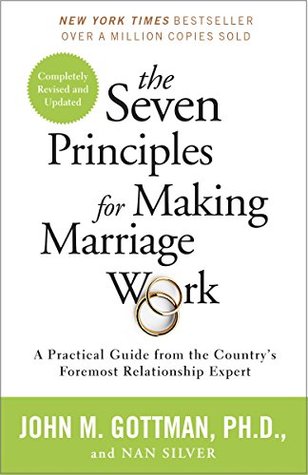More on this book
Community
Kindle Notes & Highlights
Read between
July 7 - July 31, 2025
Despite what many therapists will tell you, you don’t have to resolve your major marital conflicts for your marriage to thrive.
After the Honeymoon:
No one is right. There is no absolute reality in marital conflict, only two subjective ones. This is true whether the disagreement is solvable or perpetual. As my friend Dan Siegel says, “There is no immaculate perception.” It will help you resolve your differences if you remember this basic truth. Acceptance is crucial. It is virtually impossible for people to heed advice unless they believe the other person understands, respects, and accepts them for who they are. When people feel criticized, disliked, or unappreciated, they are unable to change. Instead, they feel under siege, and they dig
...more
This highlight has been truncated due to consecutive passage length restrictions.
on the weekends. Harsh start-up: You have no idea how to have a good time. You’re a workaholic. Your softened alternative: 7. You wish that the two of you could save more money. Harsh start-up: You don’t have a clue about how to manage money. Your softened alternative: 8. You wish your partner would spend more money buying you surprise presents. Harsh start-up: When was the last time you bought me anything? Your softened alternative: Sample Answers
on the weekends. Harsh start-up: You have no idea how to have a good time. You’re a workaholic. Your softened alternative: 7. You wish that the two of you could save more money. Harsh start-up: You don’t have a clue about how to manage money. Your softened alternative: 8. You wish your partner would spend more money buying you surprise presents. Harsh start-up: When was the last time you bought me anything? Your softened alternative: Sample Answers
I Feel 1. I’m getting scared. 2. Please say that more gently. 3. Did I do something wrong? 4. That hurt my feelings. 5. That felt like an insult. 6. I’m feeling sad. 7. I feel blamed. Can you rephrase that? 8. I’m feeling unappreciated. 9. I feel defensive. Can you rephrase that? 10. Please don’t lecture me. 11. I don’t feel like you understand me right now. 12. I am starting to feel flooded. 13. I feel criticized. Can you rephrase that? 14. I’m getting worried. I Need to Calm Down 1. Can you make things safer for me? 2. I need things to be calmer right now. 3. I need your support right now.
...more
This highlight has been truncated due to consecutive passage length restrictions.
It is harder for a man’s body to calm down after an argument than a woman’s.
Like it or not, compromise is the only way to solve marital problems. In an intimate, loving relationship, it just doesn’t work for either of you to get things all your way, even if you’re convinced that you’re right. This approach would create such inequity and unfairness that the marriage would suffer. Often when couples don’t succeed at compromising, it isn’t through lack of trying but because they’ve gone about it the wrong way. Negotiation is possible only after you’ve followed the steps above—softening start-up, repairing your discussion, and keeping calm. Together, these will create a
...more
As I’ve said, men tend to have a harder time accepting influence from their wives than vice versa. But whatever your gender, an inability to be open-minded is a real liability when it comes to conflict resolution. So
objective bystander would consider reasonable.
When you are able to compromise on a solvable problem in a way that leaves you both satisfied, you prevent the issue from turning into a damaging, gridlocked conflict. But these arguments can still leave scars, even if you get past the issues that triggered them. I call this residual damage an “emotional injury.” William Faulkner said it best in Requiem for a Nun: “The past is never dead. In fact, it’s not even past.” We can revisit the past because it still lives in our bodies in the present. If emotional injuries aren’t addressed, they tend to become constant irritants—like a stone in your
...more
The task: Maintaining connection and intimacy amid the distractions of the Internet Age. How much time do you think most couples spend (or should spend) talking with each other? In a recent study of young professional couples, researchers in Los Angeles calculated (after monitoring them 24/7) that the average amount of time they actually engaged in conversation was thirty-five minutes. A week! What’s more, much of their conversation was really what I would call errand-talk, such as who was going to take out the garbage or walk the kids to the school bus. I find this very sad. While there are
...more
This highlight has been truncated due to consecutive passage length restrictions.
Scheduling formal griping sessions can prevent the spillover of everyday stress into your marriage.
The solution: Acknowledge that at the end of a long, stressful day you may need time to yourselves to decompress before interacting with each other. If you are feeling suddenly outraged by something your spouse did, realize that the incident may be overblown in your mind because you’re feeling so tense. Likewise, if your spouse comes home with a cloud over his or her head and your “What’s wrong?” gets answered with a snarl, try not to take it personally. He or she probably just had a bad day. Rather than making the situation worse by lashing out, let it go.


